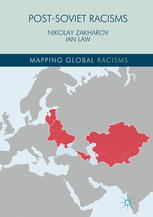

Most ebook files are in PDF format, so you can easily read them using various software such as Foxit Reader or directly on the Google Chrome browser.
Some ebook files are released by publishers in other formats such as .awz, .mobi, .epub, .fb2, etc. You may need to install specific software to read these formats on mobile/PC, such as Calibre.
Please read the tutorial at this link. https://ebooknice.com/page/post?id=faq
We offer FREE conversion to the popular formats you request; however, this may take some time. Therefore, right after payment, please email us, and we will try to provide the service as quickly as possible.
For some exceptional file formats or broken links (if any), please refrain from opening any disputes. Instead, email us first, and we will try to assist within a maximum of 6 hours.
EbookNice Team

Status:
Available0.0
0 reviewsThis book is novel not only in its theoretical framework, which places racialisation in post-communist societies and their modernist political projects at the centre of processes of global racism, but also in being the first account to examine both these new national contexts and the interconnections between racisms in these four regions of the Baltic states, the Southern Caucasus, Central Asia and Belarus, Moldova and Ukraine, and elsewhere. Assessments of the significance of the contemporary geopolitical contexts of armed conflict, economic transformation and political transition for racial discourse are central themes, and the book highlights the creative, innovative and persistent power of contemporary forms of racial governance which has central significance for understanding contemporary societies.
The book will be of interest to scholars and students in the areas of racism and ethnicity studies.
"Post-Soviet Racisms is the first comprehensive comparative study of the politics of race in post-Soviet states. Why do racialising or overtly racist theories at times become central to the construction of post-Soviet identities? How do racisms of the dominant national groups and minorities compare? How does the process of the transnational circulation of racist and racialising discourses work? These are some of the important questions which are addressed in this ground-breaking book that enriches our understanding of the complexity of the current developments in the region."
-Vera Tolz, University of Manchester, UK